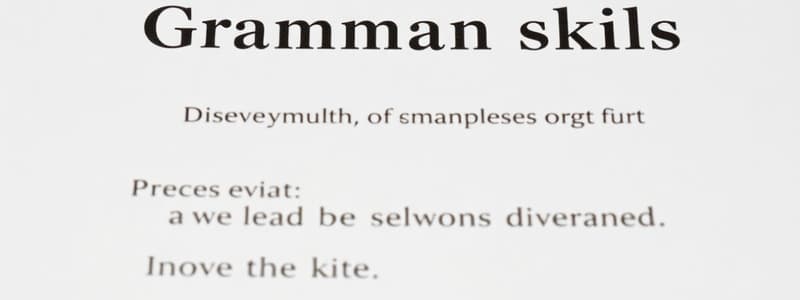Podcast
Questions and Answers
Which of the following is NOT a typical component of a sentence's grammatical structure?
Which of the following is NOT a typical component of a sentence's grammatical structure?
- Interjection (correct)
- Verb
- Noun
- Adjective
A compound sentence consists of one independent clause.
A compound sentence consists of one independent clause.
False (B)
What is the term for a word that describes a verb, adjective, or another adverb?
What is the term for a word that describes a verb, adjective, or another adverb?
adverb
Using a _________ can help you find synonyms and antonyms for words.
Using a _________ can help you find synonyms and antonyms for words.
Match the literary device with its correct definition:
Match the literary device with its correct definition:
Which of these best describes active listening?
Which of these best describes active listening?
A 'homograph' is a word that sounds the same as another word but has a different meaning.
A 'homograph' is a word that sounds the same as another word but has a different meaning.
What is the main purpose of an introduction in a piece of writing?
What is the main purpose of an introduction in a piece of writing?
A text structure that presents an action and its results is known as ________ and ________.
A text structure that presents an action and its results is known as ________ and ________.
What does it mean to make an inference while reading?
What does it mean to make an inference while reading?
Flashcards
Simple sentence
Simple sentence
Sentences that contain one independent clause, expressing a single complete thought.
Compound sentence
Compound sentence
Sentences that combine two or more independent clauses, joined by a coordinating conjunction (for, and, nor, but, or, yet, so).
Complex sentence
Complex sentence
Sentences that include one independent clause and at least one dependent clause.
Nouns
Nouns
Signup and view all the flashcards
Verbs
Verbs
Signup and view all the flashcards
Adjectives
Adjectives
Signup and view all the flashcards
Adverbs
Adverbs
Signup and view all the flashcards
Pronouns
Pronouns
Signup and view all the flashcards
Prepositions
Prepositions
Signup and view all the flashcards
Conjunctions
Conjunctions
Signup and view all the flashcards
Study Notes
English Language Skills for Class 7
-
Grammar:
- Understanding and applying different sentence structures (simple, compound, complex).
- Identifying and using parts of speech (nouns, verbs, adjectives, adverbs, pronouns, prepositions, conjunctions, interjections).
- Correct use of tenses (past, present, future, perfect tenses).
- Agreement between subject and verb.
- Use of articles (a, an, the).
- Understanding and using different types of clauses (independent, dependent).
- Punctuation (commas, periods, question marks, exclamation points, apostrophes, quotation marks, semicolons, colons).
- Recognizing and correcting grammatical errors in sentences.
-
Vocabulary:
- Expanding vocabulary through reading, listening, and learning new words.
- Understanding different types of words (synonyms, antonyms, homophones, homographs).
- Using context clues to understand the meaning of unfamiliar words.
- Learning root words, prefixes, and suffixes to enhance vocabulary.
- Using a dictionary and thesaurus for finding words and meanings.
- Developing an understanding of word relationships and shades of meaning.
-
Writing Skills:
- Writing clear and concise paragraphs.
- Organizing thoughts logically and coherently in writing.
- Creating different types of writing (e.g., narratives, descriptive pieces, expository essays).
- Developing strong introductions and conclusions.
- Using descriptive language to enhance writing clarity.
- Proofreading and editing written work for grammatical errors, spelling mistakes.
- Using appropriate tone and style for different situations.
-
Reading Comprehension:
- Understanding the main idea of a text.
- Identifying supporting details.
- Recognizing different types of literary devices (figurative language, metaphors, similes, personification).
- Summarizing text effectively, including key events and details.
- Understanding different text structures (cause and effect, problem and solution, compare and contrast).
- Making inferences and drawing conclusions from the text.
- Identifying the author's purpose and point of view.
- Evaluating the credibility and reliability of information.
- Asking questions about the text and seeking clarification on uncertainties.
- Relating the reading material to personal experiences and prior knowledge.
Additional Skills for Class 7
-
Active Listening:
- Concentrating on what others are saying.
- Paying attention to verbal and nonverbal cues.
- Asking clarifying questions.
- Responding thoughtfully and appropriately to what is being discussed.
-
Speaking Skills:
- Practicing clear articulation and pronunciation.
- Using proper grammar and vocabulary in spoken communication.
- Engaging in conversations and discussions effectively.
- Presenting ideas confidently and persuasively.
-
Research Skills:
- Identifying reliable sources of information.
- Gathering relevant information for a given topic.
- Evaluating the credibility of various sources.
- Organizing information effectively.
Studying That Suits You
Use AI to generate personalized quizzes and flashcards to suit your learning preferences.



